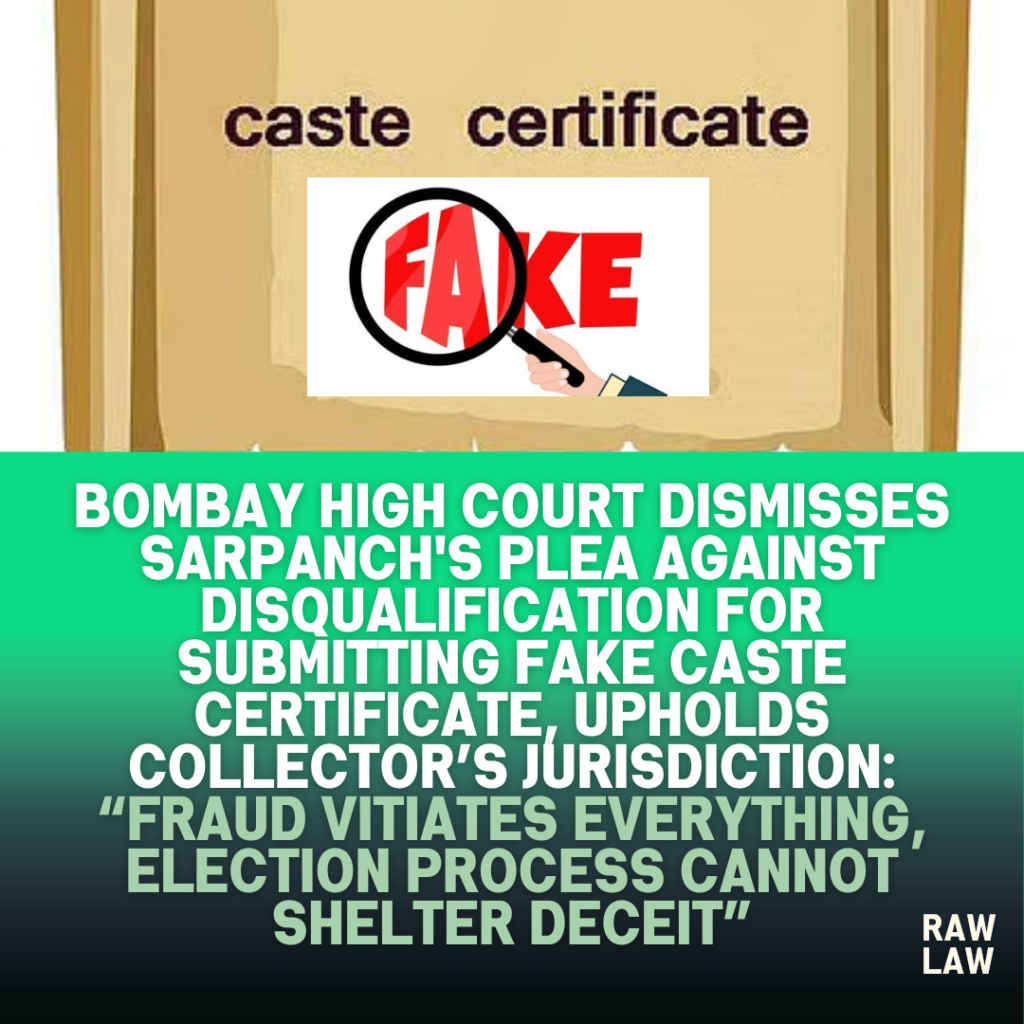Court’s Decision
The Bombay High Court dismissed the writ petition challenging the Additional Divisional Commissioner and Collector’s orders disqualifying the petitioner from the post of Sarpanch for submitting a fabricated caste validity certificate to contest a seat reserved for the Other Backward Class category. The Court held that the Collector has jurisdiction under Section 33(5) of the Maharashtra Village Panchayat Act, 1959 to decide disputes arising from the validity of elections, including those involving fraud or misrepresentation during the nomination stage. It concluded that presenting a fake caste validity certificate amounted to fraud, which vitiates the entire election, thereby justifying the disqualification.
Facts
The petitioner, elected as a member of the Village Panchayat under the general women’s category in 2021, contested and was declared elected as Sarpanch in March 2024 for a post reserved for the Other Backward Class category. Respondent No. 7 filed a Gram Panchayat dispute alleging that the petitioner had submitted a fabricated caste validity certificate in the name of another person to support her nomination. An inquiry confirmed that the certificate was not issued by the competent authority. The Collector disqualified the petitioner under Section 33 of the Maharashtra Village Panchayat Act, which was upheld on appeal by the Additional Divisional Commissioner, leading to the present writ petition.
Issues
- Whether the Collector had jurisdiction under Section 33(5) of the Maharashtra Village Panchayat Act, 1959 to adjudicate disputes regarding the validity of an election on grounds of fraud due to submission of a false caste certificate.
- Whether the petitioner’s disqualification for presenting a fabricated caste validity certificate was justified.
Petitioner’s Arguments
The petitioner argued that she was initially elected under the Open Women category and had submitted only a token or acknowledgment of a pending caste validity claim, which was later accepted with a valid certificate issued on 01.10.2024. She contended that objections regarding the validity certificate could not be raised under Section 33 and that the election process was completed without challenge, making post-election disqualification beyond the Collector’s jurisdiction.
Respondent’s Arguments
The State and the complainant justified the Collector’s order, arguing that the petitioner presented a fabricated validity certificate at the time of nomination, leading to her wrongful acceptance as a candidate for the reserved category. They contended that the Collector has jurisdiction under Section 33(5) to decide disputes concerning fraud impacting election validity, and that fraud cannot be shielded under procedural technicalities.
Analysis of the Law
Section 33(5) of the Maharashtra Village Panchayat Act, 1959 allows the Collector to decide disputes regarding the validity of elections of Sarpanch and Upa-Sarpanch, with a subsequent appeal before the Divisional Commissioner. The phrase “dispute arising as to the validity of the election” encompasses examination of the entire election process, including the nomination stage. Fraud, if proven, vitiates the entire process, and the law does not limit the Collector’s jurisdiction only to procedural irregularities during voting or counting.
Precedent Analysis
The Court relied on Durga Shankar Mehta v. Raghuraj Singh (AIR 1954 SC 520), where the Supreme Court held that when a candidate is constitutionally incapable of being elected due to disqualification or fraud, the election is void, and the authority has the jurisdiction to declare it so. This precedent supported the Collector’s power to annul elections vitiated by fraud.
Court’s Reasoning
The Court observed that the election officer’s notes indicated that the petitioner had submitted a caste validity certificate with her nomination, leading to its acceptance while other candidates without certificates were disqualified. Since the competent authority confirmed that the certificate was fabricated, the petitioner’s election stood on fraudulent grounds, making her disqualification under Section 33(5) justified. The Court reiterated that fraud vitiates the entire process and that the Collector’s jurisdiction extends to declaring such elections void to protect the sanctity of the reserved category elections.
Conclusion
The Bombay High Court dismissed the writ petition, upholding the Collector’s and the Additional Divisional Commissioner’s orders disqualifying the petitioner from the post of Sarpanch for submitting a fabricated caste validity certificate. It ruled that the Collector has jurisdiction under Section 33(5) to adjudicate disputes involving fraud in the election process, reaffirming that elections tainted by fraud cannot stand.
Implications
- Reinforces the principle that fraud in elections vitiates the entire process.
- Clarifies that Collectors have jurisdiction under Section 33(5) to address fraud-related disputes in Panchayat elections.
- Upholds the sanctity of reserved category elections, ensuring that misuse through fake certificates will lead to disqualification.
Referred Case and Its Relevance
Durga Shankar Mehta v. Raghuraj Singh (AIR 1954 SC 520): This precedent was cited to hold that elections of candidates constitutionally incapable of being elected (due to fraud or disqualification) are void, supporting the Collector’s jurisdiction under Section 33(5) to annul such elections when fraud is discovered post-election.
FAQs
1. Can a Collector disqualify a Sarpanch for submitting a fake caste certificate during elections?
Yes, under Section 33(5) of the Maharashtra Village Panchayat Act, the Collector has jurisdiction to disqualify candidates if fraud or misrepresentation impacting the election process is established.
2. Does presenting a fake caste certificate during nomination invalidate an election even if the election was uncontested?
Yes, submission of a fabricated caste validity certificate amounts to fraud, which vitiates the election process, allowing post-election disqualification.
3. Why is Durga Shankar Mehta’s case relevant in such election disputes?
It establishes that elections of candidates who are constitutionally disqualified due to fraud are void, supporting authorities’ power to annul such elections to protect electoral integrity.



